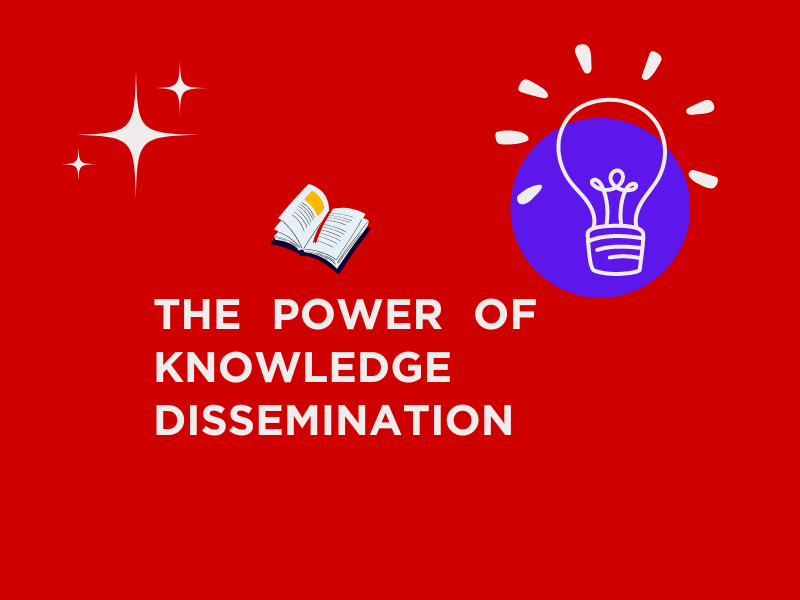In an age defined by the rapid exchange of information, the concept of “knowledge dissemination” emerges as a driving force behind societal evolution. The art of effectively sharing knowledge transcends mere information transfer—it’s about catalyzing transformation through the widespread distribution of ideas, discoveries, and expertise. As this article explores the multifaceted aspects of knowledge dissemination, it uncovers how this process not only empowers individuals with valuable insights but also fuels collective progress by bridging gaps and fostering collaboration. From educational institutions to digital platforms, the practice of knowledge dissemination has become integral to unlocking the full potential of human intellect and driving innovation forward.
The Essence of Knowledge Dissemination
At its core, knowledge dissemination serves as the vital link that democratizes expertise. It transforms intricate ideas into relatable narratives, enabling the exchange of wisdom across boundaries. This process doesn’t just involve making information understandable; it sparks conversations, ignites curiosity, and empowers individuals to make informed decisions. From scholarly research to practical applications, the essence of knowledge dissemination lies in its ability to enrich society by allowing insights to transcend their origins and take root in the collective consciousness, propelling progress and enlightenment.
Empowering Minds and Transforming Societies
Knowledge dissemination is a catalyst for empowerment and societal evolution. By distilling complex information into accessible forms, it equips individuals with the capacity to engage in critical thinking, informed decision-making, and problem-solving. Beyond individual growth, the process transforms communities by sparking innovation and fostering dialogue. As disseminated knowledge spreads its wings across fields like healthcare, education, technology, and governance, it propels progress and strengthens the foundation of a knowledge-driven society.
Bridging the Gap: Researchers and the Public
Knowledge dissemination plays a pivotal role in connecting researchers and the public. It serves as a conduit for researchers to share their valuable insights with a wider audience beyond the academic realm. By employing engaging and accessible mediums, such as presentations, simplified articles, and interactive workshops, knowledge dissemination breaks down complex concepts, making them relatable and understandable for people from various walks of life. This bridge between researchers and the public fosters a more informed and enlightened society.
Catalyzing Learning and Lifelong Growth
Knowledge dissemination serves as a catalyst for continuous learning and personal growth. Providing access to workshops, seminars, and online resources, encourages individuals to venture beyond their comfort zones, explore new ideas, and critically engage with information. This process cultivates a culture of curiosity, enabling people to embrace lifelong learning. Through knowledge dissemination, individuals are empowered to expand their horizons, challenge their existing beliefs, and evolve intellectually, contributing to their personal development and the enrichment of society as a whole.
Digital Age and Information Democracy
In the digital age, knowledge dissemination has experienced a paradigm shift. The rise of the internet and social media has democratized access to information, granting individuals unprecedented access to a wealth of insights. However, this surge in information availability also highlights the crucial role of responsible knowledge dissemination. With an overwhelming amount of content circulating online, the emphasis on accuracy, reliability, and impartiality is paramount. Ensuring that credible information is effectively shared becomes pivotal in upholding the principles of informed decision-making and fostering a well-informed and educated society.
Driving Innovation and Societal Change
Effective knowledge dissemination fuels innovation by serving as a platform for sharing ideas and discoveries, enabling the creation of new insights and advancements. Moreover, its impact extends to driving positive societal change. When individuals are informed and engaged through well-disseminated knowledge, they become active participants in public discourse, advocating for policy reforms and holding institutions accountable. This process creates a ripple effect that contributes to the betterment of society by fostering informed decision-making and collaborative efforts toward a more progressive and responsive future.
Challenges and Ethical Considerations
Knowledge dissemination, despite its significant advantages, is not without challenges. The accuracy and reliability of shared information are paramount in an era where misinformation can swiftly proliferate. Maintaining the ethical integrity of the process is equally vital, as it involves issues such as proper attribution to researchers and respect for intellectual property rights. Negotiating these challenges requires a delicate balance between the freedom to share information and the responsibility to ensure its authenticity, ultimately upholding the credibility and effectiveness of knowledge dissemination efforts.
Closing the Gap: Inclusivity and Accessibility
In the pursuit of effective knowledge dissemination, inclusivity and accessibility play a crucial role. To truly bridge the gap, information must be presented in diverse languages, formats, and mediums, catering to the needs of a wide range of audiences. Moreover, this inclusivity should extend to marginalized communities, ensuring that they have equitable access to the insights that knowledge dissemination provides. By embracing an inclusive approach, we empower individuals from all walks of life to engage, learn, and contribute, fostering a more equitable and enriched society.
Towards a Knowledge-Driven Future
As we navigate the swiftly changing landscape of the modern world, the significance of knowledge dissemination becomes increasingly evident. This process not only empowers individuals with insights and information but also acts as a driving force behind innovation and societal advancement. By upholding the principles of accuracy, responsibility, and accessibility in knowledge dissemination, we pave the way for a future where information serves as a transformative agent, fostering positive change, progress, and a more enlightened global community.
Conclusion: Empowering Minds, Igniting Change
In the tapestry of our evolving world, the threads of knowledge dissemination are intricately woven. Beyond data and facts, it’s about empowerment, learning, and catalyzing change. The ethics of responsible sharing bear a universal responsibility, transcending boundaries. As we navigate this age of information, let’s weave a fabric of inclusivity, ensuring the transformative potential of insights reaches every nook. This commitment doesn’t just enlighten minds; it fuels progress, propels innovation, and shapes a future brimming with informed possibility. In this symphony of connectivity, knowledge dissemination harmonizes empowerment and change for a more illuminated global stage.
